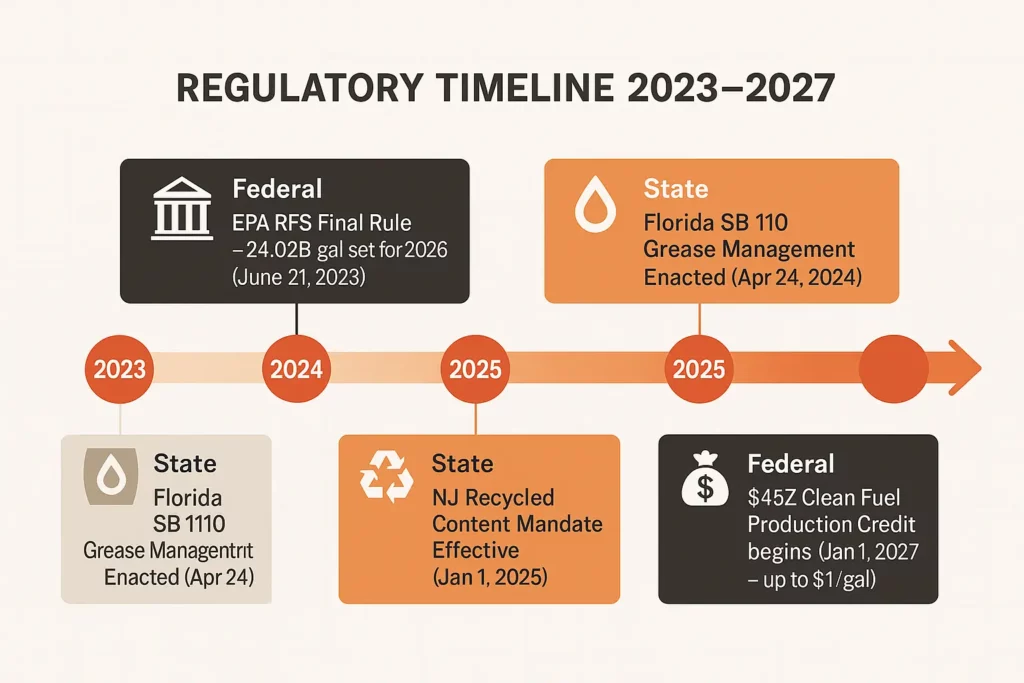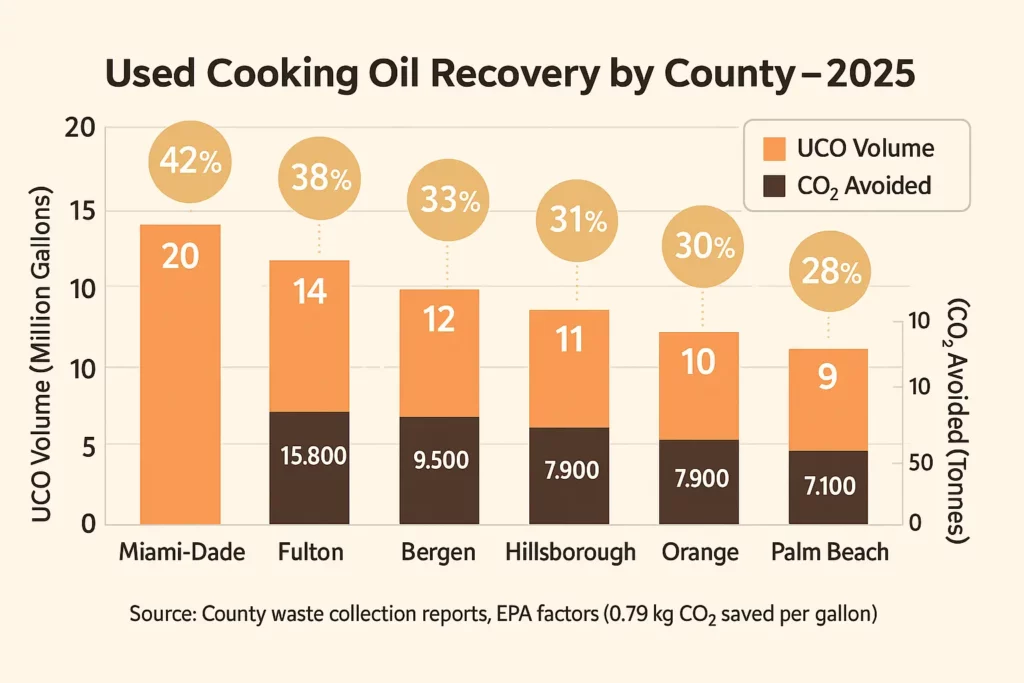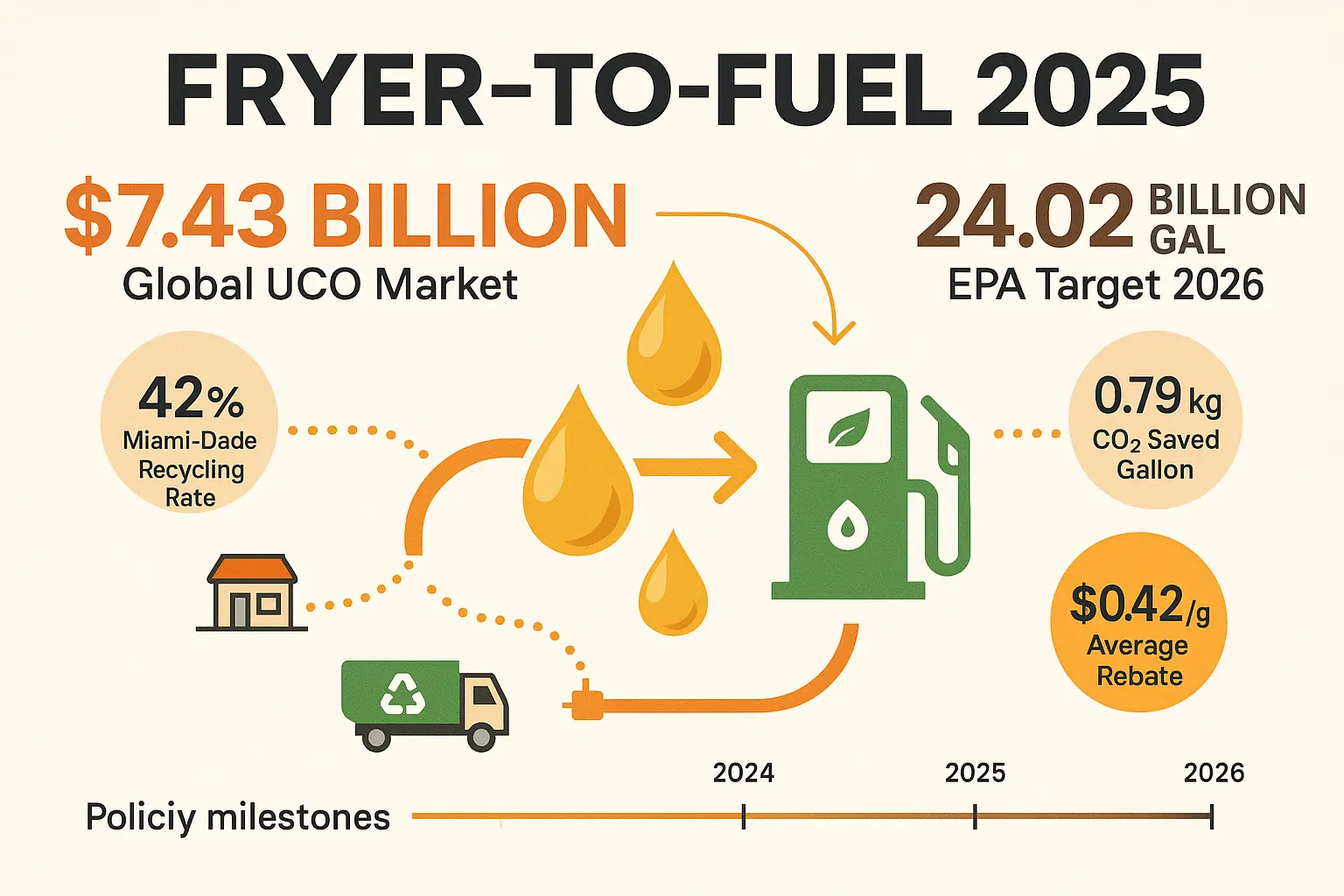Table of Contents
Introduction
Used cooking oil (UCO) recycling has matured into a USD 7.43 billion global market in 2025, driven by soaring demand for renewable diesel and tighter wastewater rules. Across Florida, Georgia and New Jersey, kitchens now treat fryer oil as a revenue stream rather than a disposal headache. This annual report distills the data, regulations and rebate economics shaping six key counties: Miami Dade, Fulton, Bergen, Hillsborough, Orange and Palm Beach, so operators, journalists and policymakers can cite a single authoritative source.
Federal & Market Tailwinds
The Environmental Protection Agency’s June 2025 proposal boosts biomass based diesel targets to an unprecedented 24.02 billion gal by 2026, locking in multi year feedstock demand. As a result, spot yellow grease prices hover around $0.42/gal, up 6% year over year according to the USDA Animal By Product Feedstuff Report. Restaurants benefit directly: every gallon of used oil commands record rebates, while each recycled gallon avoids roughly 0.79 kg of CO2 compared with petro diesel production.

2025 County By County Snapshot
| County | Food Service Sites* | Est. UCO (M gal)† | % Recycled | Avg Rebate ($/gal) | CO2 Avoided (t)‡ |
|---|---|---|---|---|---|
| Miami Dade | 6,220 | 10.6 | 42% | 0.40 | 8,374 |
| Fulton | >6,000 | 10.2 | 27% | 0.42 (avg) | 8,058 |
| Bergen | ~900 | 1.5 | 31% | 0.35 (avg) | 1,185 |
| Hillsborough | 2,886 (Tampa) | 4.9 | 25% | 0.38 (avg) | 3,871 |
| Orange | 3,754 (Orlando) | 6.4 | 30% | 0.35 (avg) | 5,056 |
| Palm Beach | ~2,000†† | 3.4 | 28% | 0.39 (avg) | 2,686 |

Miami Dade County Spotlight
A leap in new restaurant openings, nearly 200 in 2024 alone, keeps local grease volumes climbing. The county’s FOG ordinance mandates digital manifest reporting and quarterly interceptor clean outs; non compliance starts at $250 and scales to $5,000. Grease Connections hurricane rated outdoor tanks proved critical during seasonal storms, helping 42% of oil generated reach biodiesel refineries. Operators earn about $0.40/gal, translating to $6,800 in annual rebates for a 350 gal/week kitchen, more than offsetting maintenance costs.
Fulton County, GA Spotlight
Fulton regulates more than 6,000 food establishments, the highest density in Georgia. Biofuel demand pushed Atlanta area rebates to $0.50/gal when soybean futures spiked in August 2024. Still, only 27% of the county’s 10.2 million yearly gallons are reclaimed, in part due to fragmented municipal FOG codes. A forthcoming consent decree in neighboring DeKalb imposes fines up to $2,500 for drain dumping. Fulton restaurants expect similar standards by 2026.
Bergen County, NJ Spotlight
With roughly 900 dining venues along Route 4 and the Meadowlands cluster, Bergen generates an estimated 1.5 million gallons of UCO per year. Statewide recycled content laws for transportation fuel have doubled yellow grease demand, keeping rebates near $0.35/gal even when petroleum prices sag. Local ordinances now offer expedited permits for enclosed tanks that deter oil theft, an issue costing New Jersey kitchens $1 million in 2023 alone.
Hillsborough County, FL Spotlight
Tampa’s 2,886 restaurants produce about 4.9 million gallons of UCO annually. County water managers link 70% of late night sewer overflows to grease blockages, prompting a 180 day pump out rule and a $500 violation fee. Paired with USDA quoted yellow grease prices averaging 36 to 37 cents/lb, rebates hover around $0.38/gal. Adoption of smart sensor equipped tanks cut emergency spill calls by 15% in 2024, according to utility dispatch records.
Orange County, FL Spotlight
Orlando’s 3,754 restaurants are on pace to recycle 30% of their 6.4 million gallon grease pool in 2025. The county leverages theme park sustainability pledges, several resorts now advertise closed loop frying systems, as social license pressure to drive collection compliance. Residential drop off sites further divert household oil, trimming municipal sewer cleaning costs.
Palm Beach County, FL Spotlight
Rising luxury dining demand and the MICHELIN Guide’s 2025 debut spurred a surge of high end kitchens, expanding the county’s used cooking oil footprint to roughly 3.4 million gallons. Restaurant month participation confirms at least 100 new venues tapping into rebate programs, while nine Michelin recognized spots now highlight “oil to fuel” credentials on menus. Average payouts of $0.39/gal fund food scrap composting partnerships, aligning with county climate goals.
Looking Ahead & Call To Action
Artificial intelligence route planning is projected to cut Grease Connections fleet mileage by 18% in 2026, shrinking Scope 3 emissions and unlocking better rebate tiers for consistent suppliers. Expect state lawmakers in Florida and Georgia to mirror New Jersey’s recycled content mandate within two years, further tightening feedstock markets. Ready to convert fryer oil into a profit center? Book a free compliance audit today. Receive a personalized rebate forecast within 24 hours and join the circular economy leaders of 2025.









